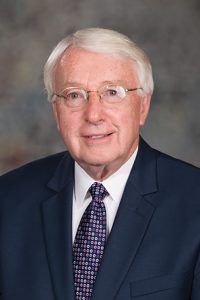Licensed practical nurse changes proposed
The Health and Human Services Committee heard testimony Feb. 3 on a bill that would allow licensed practical nurses (LPNs) to provide intravenous (IV) therapy.

LB283, introduced by Ralston Sen. Merv Riepe, also would eliminate the Licensed Practical Nurse-Certified (LPN-C) Practice Act.
Riepe said the goal of the bill is to integrate current LPN-C requirements into the state’s LPN requirements, eliminating the need for a separate practice act for the former. He said LB283 is the result of a scope of practice review — also known as a 407 process — and has been agreed to by all the relevant parties.
LPNs are vital to critical access and long-term care facilities, he said, especially in rural Nebraska. The state’s credentialing requirements should be streamlined to reflect current LPN training, he said.
“I think [the bill] will help across the state with nursing home and hospital workforce issues,” Riepe said. “It’s important that we don’t diminish our skilled labor pool.”
Karen Weidner, testifying on behalf of the Nebraska Board of Nursing, supported the bill. Nebraska is one of only a handful of states to still require a separate credential for IV therapy, she said, and it is no longer necessary.
“There is no reciprocity, so Nebraska duel licensure is an impediment to LPNs coming from other states with IV therapy credentials and skills,” Weidner said. “In addition, as of May 1, 2016, all LPN graduates in Nebraska have completed education and training in IV therapy skills.”
Testifying on behalf of the Nebraska Nurses Association, Linda Stones also supported the bill. She said any LPN requiring further training to comply with the bill’s provisions has a number of options for acquiring it under LB283.
“LPNs play an important role in providing care and we need their licenses to reflect the care that they are educated to give,” Stones said. “[This bill] will allow LPNs to practice to the fullest extent of their education and training.”
Under the bill, an LPN could provide IV therapy if he or she holds a valid license issued by the state Department of Health and Human Services before May 1, 2016, under the Licensed Practical Nurse-Certified Practice Act as it existed at that time.
An LPN also would qualify if he or she graduated from an approved practical nursing program on or before May 1, 2016, and completes, within five years of the bill’s operative date, an 8-hour didactic course in IV therapy and an approved employer-specific IV therapy skills course.
The bill specifies that an LPN who is not required to provide IV therapy would not be required to complete the therapy skills course.
No one testified in opposition to the bill and the committee took no immediate action on it.

